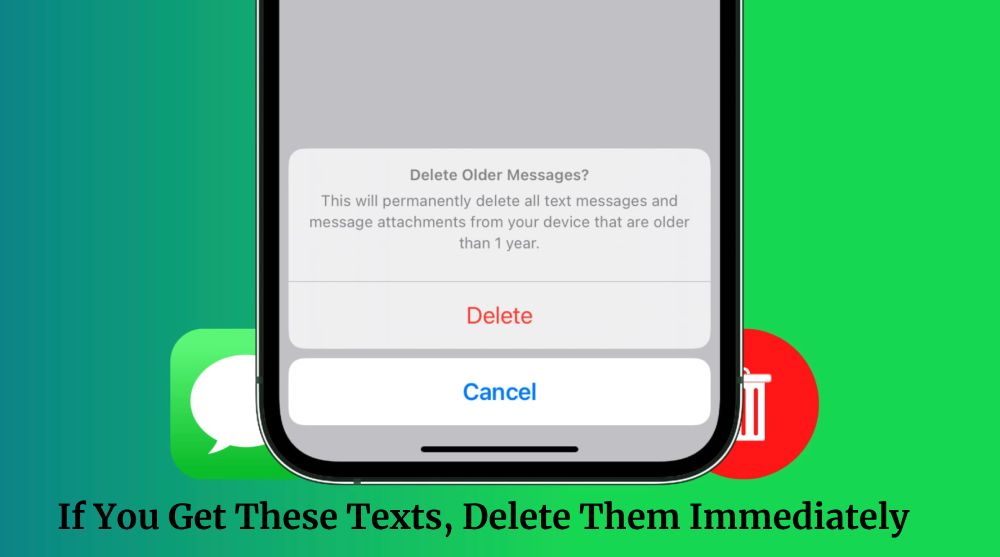You’re not the only one who receives texts from friends and family. It’s the same for scammers!
There are plenty of fish in the sea when it comes to finding true love. In the digital world of cyber hacking, they’re known as “phish,” a scamming tactic used to trick people into providing confidential information about their bank, credit card, or other personal accounts. Cybercriminals can now reach you via SMS (text message) through a popular phishing scam dubbed “smishing,” a phishing scam that started out as phone calls and emails.
If you receive a text message from someone you do not know, it’s best to ignore it or delete it, says Stephen Cobb, senior security researcher at ESET, which makes antivirus and Internet security software. The smarter criminals will rotate the numbers they send you messages from. Read on for a list of the different types of smishing attacks you should be aware of. While we’re talking about phones, here are 13 ways to improve cell reception at home.
0 seconds of 1 minute, 42 sec

Table of Contents
The “acquaintance” you never met
Some scammers pretend to know you and send a friendly message to lure you in. A message such as this may appear in USA Today: Beautiful weekend is just around the corner. Are you up for going out? Your number was given to me by Sophie. You can view my profile here: [URL].
They attempt to maintain their not-so-suspicious appearance by using names like Don or Ann that aren’t too obvious or hard to pronounce. Having learned about smishing, here are some other tricks con artists use to gain your trust.
Your package is pending
It might seem tempting to click on a text message saying you have a package waiting for you, but think twice before you do. There has been a new text message scam going around the country. It has been reported that people have received messages stating: [Name], we found a parcel/package that is pending for you from [a recent month].
You can claim ownership and confirm delivery here, and then a link will be sent to you. By clicking the link and entering personal information, cybercriminals could steal your identity, empty your bank account, or install malware on your phone. You should also avoid answering calls from these area codes.
Your bank is closing your account
Hackers often pose as trusted institutions like your bank or utility company to get your password, PIN, or other personal information. Your bank account will be closed by Bank of America, according to the message. To keep your account active, please confirm your PIN at [URL]. Cobb says it’s best to contact the company directly if you receive such a message.
These messages also contain urgent language such as “If you do not reply within 24 hours, your account will be closed.” Contact your bank for confirmation, but at least you’ll know your credentials are safe. It is also important to be careful when shopping online. There are three new phone scams and email scams to keep an eye out for.
You’ve won a major award
Prizes are fun, except when they’re smish prizes, which are wins for hackers and losses for you. This type of text is often written as: You’ve won a prize! To claim your $500 Amazon gift card, visit [URL].
Do not click on the link if you don’t remember entering anything, or you may inadvertently be downloading malicious code onto your phone, which may damage or disable it. Make sure you’re one step ahead with these tricks hackers don’t want you to know.
The phone number proximity scam
There is an old phone scam that makes an occasional comeback from years ago. Text messages are now being used by scammers as well. These texts or phone calls typically come from three-digit area codes that appear to be from the United States, but are actually from international numbers, often in the Caribbean.
The fact that it comes from your three-digit area code doesn’t mean it’s someone you know, Cobb says. You can actually do that via a number faking service. The text will often indicate that someone is in danger and needs help, and the criminal will ask you to call or text back. Also, scammers will use automated voice messaging services to keep you on the line for as long as possible. Using international calls can send your phone bill skyrocketing, which means smishers make a lot of money.
Messages or calls from these area codes should be avoided, according to the Federal Trade Commission: 268, 284, 473, 664, 649, 767, 809, 829, 849, and 876. Do not answer or text numbers you do not know. The more they know you, the more likely they are to contact you again. Here are 10 more phone call scams you should be aware of.
Your debit card is locked
Nobody wants to have problems with their bank. You might be tempted to click the link provided in a text alerting you that your debit card has been locked due to suspicious activity—which is exactly what you shouldn’t do.
It is never a good idea to reply to an email, phone call or text message that asks you for your personal or account information, either directly in the email or on the website the email directs you to, says Chase.
Instead of clicking on any link in a text message, contact Chase directly to find out what’s going on with your account in order to avoid being scammed. Millennials are the most likely to fall victim to phone scams because of this.
Set your delivery preferences for your FedEx package
When you receive notification that your FedEx package has been delivered, it is always a relief. It’s best to take a second before clicking on a text that looks like it’s from FedEx. As reported by CNN, the text messages contain a supposed tracking code and link to “set delivery preferences.” The link leads to a fake Amazon listing, which asks people to take a survey, after which a free gift is offered. Isn’t that wonderful?
They just need to enter their personal information and credit card information—what could possibly go wrong? FedEx does not ask for payment or personal information in exchange for goods in transit or in FedEx’s custody via unsolicited mail, text or email. To find out what is actually happening with your package, it’s best to contact FedEx directly if you receive a text like this. Ignore phone calls from your own number.
The bottom line: Don’t click any suspicious links
Smishing scams often contain malicious code that encrypts your files and locks your phone. If that happens, smishers essentially hold your phone hostage and demand money in return for access. Your personal online accounts may even be accessed by the code.
“The text component is important because we now have a lot of accounts that require a text code to authenticate you,” Cobb explains. Whenever a bank or Amazon asks for a text code to authenticate your identity, a hacker could intercept that code and gain remote access to your account. Cobb also recommends updating your phone’s operating system to the latest version. Security improvements are included in most operating system upgrades for smartphones.”
Using reputable apps or software that is designed to protect mobile devices is another precautionary measure you can take to safeguard your phone. Among these security solutions is ESET Mobile Security for Android devices, which has an anti-phishing feature that prevents you from clicking on malicious links within messages.
ESET’s spokesperson says, “A product like this is a good layer of security to have in case you are tempted to click, or if the scam looks so legitimate that you don’t even think twice and intuitively click.” Whenever you hear this phrase, hang up immediately, and be on the lookout for these 10 other online scams you should be aware of..
